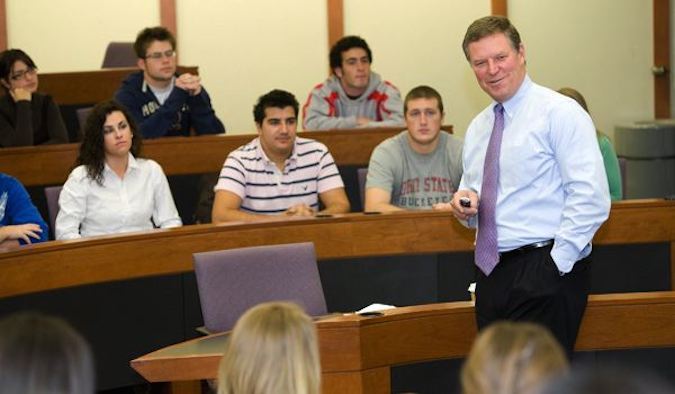
Inside an undergraduate class at Ohio State University
TRENDING FROM BOSTON HARBOR TO SOUTHERN CALIFORNIA
Ohio State’s Buckeye Capital Investors Club is one of a handful of student groups that have recently started their own stock pitch competitions. Last November, Harvard University’s Financial Analysts Club held its first annual Finance Symposium, which featured an intercollegiate stock pitch competition. Over 40 schools applied to the competition. UCLA’s Bruin Value Investing Club also started its first stock pitch competition this winter, attracting nearly 130 students from within the university.
Stock pitch competitions can be especially valuable to students from the Midwest or Texas, who may not necessarily have the opportunity to network as frequently with Wall Street professionals, Coombs says. This year, the SeekingAlpha.com competition attracted nine teams, including students from Bentley University, Texas A&M and University of Texas, and Coombs would like to see that number double next year. A team of students from Fordham University walked away with the $3,000 top prize, but even students who didn’t win still got valuable face time with bankers from Goldman Sachs and other firms.
“It really is a great way for students to network with investment professionals and gain notoriety in the investment world in a way in which others might not have the opportunity to do so,” explains Coombs. “Students who go to Ivy League schools in the Northeast or ones located in New York City have easy access to Wall Street, but it’s not so easy for students in say, Texas, to do that.”
BALANCING CREATIVITY AND FINANCIAL REASONING
One of the most established stock pitch competitions in the undergraduate B-school world is the Interactive Investment Club’s Undergraduate Investment Conference at the University of Michigan’s Ross School of Business. The competition, now in its ninth year, attracts about twenty teams from across the country each fall, including ones from Harvard, UCLA and Texas A&M, says Geoffrey Pottow, a Ross student who served as director of the group’s 2015 fall conference. This past year, the winning team came from Penn State, who made a case to the judges on why to buy the Ralph Lauren stock.
Students gets the chance to test their stock predictions in front of luminaires in the industry like Ken Buckfire of Miller Buckfire, Doug Chase, founder and manager of Ascendancy Capital Management LLC and, John Griffin, the founder of Blue Ridge Capital and also the keynote speaker for the conference this past fall.
It’s no easy feat to win the competition and present a pitch in front of judges who are running some of the largest hedge funds in the world, Pottow says. The teams who win the competition tend to be creative and well-rounded thinkers who can present the judges with a compelling financial model and argument on why their stock is a good investment. That’s easier said than done, Pottow believes.
“It’s really tough to walk that line. We’re really trying to predict the future and learning how to think like that is an incredible value proposition,” says Pottow. “Participating in the competition can help you get a job in the industry and you meet other people who have the same goals as you about understanding and learning how to pitch stocks. I think it gives you an incredible edge.”
DON’T MISS: BUSINESS SCHOOL CASE COMPETITIONS: WHY YOU SHOULD COMPETE











Questions about this article? Email us or leave a comment below.